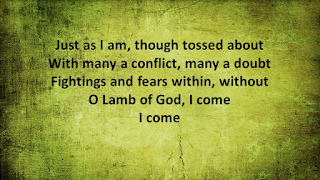Dear Friends,
This week's 'thought' comes to you from a book entitled: "Why Does it Have to Hurt?" by Dan G. McCartney. It's a book that deals with the suffering that earnest,believing, godly Christians often endure. So, if that describes your condition at this time (or the condition of someone you know) I offer his wise words to encourage your soul! Enjoy.
This week's 'thought' comes to you from a book entitled: "Why Does it Have to Hurt?" by Dan G. McCartney. It's a book that deals with the suffering that earnest,believing, godly Christians often endure. So, if that describes your condition at this time (or the condition of someone you know) I offer his wise words to encourage your soul! Enjoy.
"The Second Lesson of Job: Honesty is the Best Policy."
"In the New Testament, James refers to Job as a great example of patience and perseverance (James 5:10-11). [Yet] Job does not look to us like a great example of either patience or piety. He complains bitterly chapter after chapter. He moves from simple complaint and confusion in the earlier chapters to outright accusation of God in the later. This ought to show us that the proper response to suffering is not "grinning and bearing it" or uttering pious platitudes. Job's perseverance consisted in his continuing to cling to God; he kept banging on God's door until he got a response. This is what a child does with an entirely trusted parent. When circumstances cause you, the child of God, to doubt, you want reassurance. It is entirely legitimate to want reassurance, to desire some continuing evidence of God's love in the face of your suffering...
To remain openly honest is important if we are going to approach God at all. You cannot hide your true feelings from God, and God insists that you not try. Unfortunately, some Christians think that such honesty is inappropriate. An insert in my church bulletin a few weeks ago (which was dealing with prayer) raised the question whether it was right to 'tell God just how we feel.' The insert answered: 'No - we should always approach God with thankful hearts,' as though it were somehow possible to conceal from God just how we feel. But the Bible does not say this.
Not only Job, but all the most godly characters in the Bible, including people writing under inspiration, were very open about just how they felt. Jeremiah shouts at God, 'You deceived me' (Jer. 20:7). Naomi exclaims, 'Don't call me 'pleasant,' call me 'Bitter' because the Almighty has made my life very bitter' (Ruth 1:20). The psalmist cries out, 'Why have you forsaken me?' (Ps. 22:1). Were these biblical writers sinning in voicing such struggles with God? Was Jesus praying improperly when he cried out, 'Why have you forsaken me?' Are the psalm writers sinning when they only cry out and do not give thanks?
Actually, Job's friends did suggest it was wrong for Job to express to God his negative emotions (e.g. Job 15:25), but they were rebuked for their dishonesty. Even if the biblical writers did sin by accusing God, it would have been far worse to try to cover up their struggles. Honesty is more important to God than niceness. Indeed, to be the chosen of God means to be those who struggle with him, as the name 'Israel' indicates (see Gen. 32:28). Jacob was called Israel because he wrestled with God. The nation Israel too is the nation that struggled with God. To obtain God's blessing you must not give up or refuse to engage with him. Quiescent, passive refusal to engage, simply suggests you do not truly value the relationship – you just want to avoid conflict. Granted, our life with God is a struggle because we are sinners, but it only compounds the sin if we try to avoid struggling with God honestly...
Martin Luther was a great example of a man who was honest with God. Someone asked him once (at a bad time) whether he loved God. Luther's answer: 'Love God? Sometimes I hate him.' Luther surely was not denying God, and few people have been more passionately devoted to the Lord than Luther. But he was, like Job, extremely honest in his relationship – and look how God used him!"
It is humbling (and also helpful) to remember that every time we go to God and try to make him think we are anything other than what we really are at that moment; or that we’re feeling other than what we are really feeling at any given moment (happy when we're really sad; trusting when we're really doubting; confident when we're really scared; thankful when we're really struggling with the way things are going...) we are actually dishonoring Him (and our relationship with Him) by suggesting that our All-knowing God doesn't know the true condition of our heart or emotional state. That the God who knows us better than we know ourselves is somehow unaware of the state of our affections or the thought processes going on in our mind! We really do insult God, and do damage to our soul, when we suggest that the omniscient One does not know the true state of our soul.
Far better that we pray, "Lord, you know and see the sad condition of my angry, doubting and struggling heart; please forgive and heal me." That would be better than to be inwardly angry and struggling and pray with a faked piety: "Lord, I trust you like never before! You are so good and I am so thankful!" As the author states (especially when it comes to prayer): "Honesty IS the Best Policy."
Remember: That which at first appears to be irreverent may actually honor God the most,
Pastor Jeff






Comments
Post a Comment